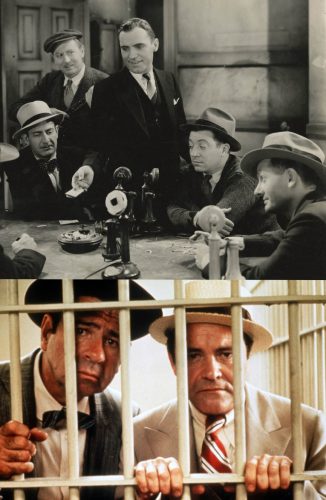The comedy The Front Page by Ben Hecht and Charles MacArthur, a sharp satire of journalists and cynical fame-seekers, centres around the final hours of a man unjustly sentenced to death. This play has left a lasting mark on the collective consciousness, thanks in part to Lewis Milestone‘s brilliant 1931 film.
In this version, Pat O’Brien plays Hildy Johnson, the Morning Post’s top reporter, who plans to quit his job to get married. Adolphe Menjou shines as Walter Burns, the unscrupulous editor willing to use any dirty trick to keep Hildy from leaving. Hildy’s defiance of Burns, such as his petty declaration, “I’ll resign over the phone”, feels like a sadomasochistic game as he tries to break free from his domineering boss.
With its fast-paced rhythm and biting wit, this film might even rival Billy Wilder’s later adaptation. It stands out for its dynamic use of space, masterful camera work, sharp editing, and inventive direction.

A brisk pace, frantic dialogue, and live sound. Working from a screenplay by Charles Lederer, Hawks creates a memorable screwball comedy, a remake of Lewis Milestone’s splendid 1931 film The Front Page, featuring Rosalind Russell and Cary Gr...

When Billy Wilder filmed his 1974 remake of The Front Page, co-writing the script with I.A.L. Diamond, he found in Hecht and MacArthur’s comedy his “ideal text.” Out of context, one might easily believe all the creative elements were Wilder’s own, so perfectly does it align with his worldview, particularly his disdain for journalism (his former profession) and, for that matter, psychoanalysts. Even the use of props, like the iconic desk, though originating from Hecht, feels distinctly “Wilderian.”
A notable twist in this version is the casting of Jack Lemmon and Walter Matthau, already an established on-screen duo from The Odd Couple (Gene Saks, 1968) and The Fortune Cookie (Billy Wilder, 1966). While their pairing might remove some of the element of surprise, it adds a layer of enjoyment in watching their well-honed chemistry at play. Wilder also sharpens the story’s central metaphor in the dialogue. When a young journalist quips, “I thought he was married to Walter Burns,” about Hildy, it perfectly encapsulates the dynamic between the two characters.